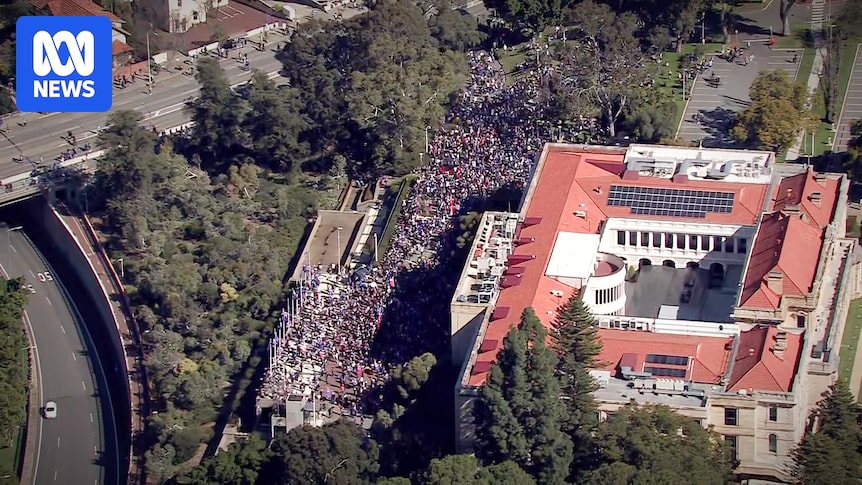
Members of a neo-Nazi group who chanted “heil Australia” during an anti-immigration rally in Perth over the weekend have not breached Western Australia’s hate laws, according to WA Police. The incident, described as “distasteful and inappropriate,” occurred during the March for Australia rallies, which took place across multiple Australian cities and towns on Sunday.
The rallies have sparked concern among experts about the tactics employed by far-right groups to engage the public in discussions about immigration. Footage from the Perth event, which was the last to commence nationwide, captured members of the neo-Nazi group amidst a crowd of approximately 5,000 participants.
Legal Implications and Police Response
WA Police confirmed their awareness of the language used at the rally, stating that while it was “not currently an offence under the prescribed legislation,” they strongly condemn any behavior promoting hate or racism. The law in Western Australia, reformed late last year, criminalizes the public display of Nazi symbols and salutes, carrying penalties of up to five years in jail, or two years and a $24,000 fine upon summary conviction.
Three individuals were charged following the Perth rally, with police issuing thirteen move-on notices. An 18-year-old woman was allegedly found with an edged weapon, and a 39-year-old man was charged with obstructing a public officer. Both are expected to appear in court later this month. A 19-year-old man also received a court summons for carrying or possessing an edged weapon.
Public Reaction and Political Response
The rally outside Parliament House on Sunday afternoon was marked by tension as organizers attempted to silence a man dressed in black, holding a megaphone adorned with symbols. The man led a chant of “heil Australia,” echoed by similarly dressed individuals in the crowd. One protester confronted the group, questioning their actions and expressing disgust.
WA Premier Roger Cook condemned the presence of neo-Nazis at the rally, calling the marches a “disgrace” and accusing participants of attempting to “demonize people in the community as part of a campaign of division and hatred.” He urged those aligned with neo-Nazi ideologies to reconsider their stance, emphasizing the divisive nature of their actions.
“If your cause aligns with the neo-Nazi movement, you know you’re on the wrong track, stop it,” Cook stated. “Stop trying to demonize people in our community because that only breeds further hatred, division, and racism.”
Opposition leader Basil Zempilas, himself the son of a migrant, echoed these sentiments, advocating for “sensible” migration policies while criticizing the behavior witnessed at the rallies. He supported police investigations into the incidents, stressing the importance of community safety and respect for the law.
Broader Context and Expert Opinions
The rise of far-right activities in Australia has been a growing concern for experts, who view the recent rallies as a “concerning development.” The events have left members of the multicultural community feeling fearful and hurt, as they witness the mobilization of extremist groups around immigration debates.
Historically, Australia has grappled with balancing its immigration policies with national identity, often facing tensions between inclusivity and xenophobia. The current climate reflects a global trend where far-right ideologies gain traction amid economic and social uncertainties.
Experts warn that “the normalization of such rhetoric can lead to increased polarization and societal division, necessitating vigilant monitoring and proactive community engagement.”
Looking Ahead
The incidents at the Perth rally highlight the challenges law enforcement and policymakers face in addressing hate speech while respecting freedom of expression. As the legal framework continues to evolve, the role of community leaders and public discourse in countering divisive narratives becomes increasingly critical.
As the individuals charged in connection with the rally prepare to face court, the broader conversation around hate laws and societal cohesion in Australia remains ongoing. The events underscore the need for continued vigilance and dialogue to foster a more inclusive and harmonious society.







